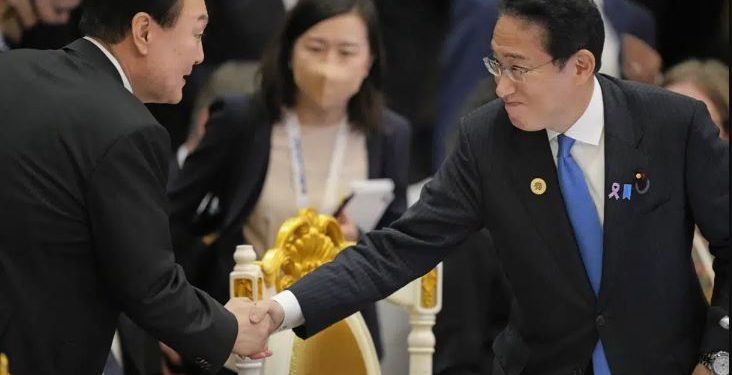Tokyo: South Korean President Yoon Suk Yeol and Japanese Prime Minister Fumio Kishida will seek to overcome disputes over history and quickly rebuild security and economic ties when they meet later Thursday for the first summit in Japan between the two nations in more than a decade.
Japan’s invitation for Yoon to visit followed South Korea’s announcement of a local compensation fund for Korean victims of wartime forced labour by Japanese companies that would not require Japanese contributions.
The summit underscores their shared sense of urgency to form a united front between North Korea and China with their mutual ally, the United States.
Hours before Yoon departed for Tokyo, North Korea launched an intercontinental ballistic missile that landed in open waters off Japan’s northern island of Hokkaido. The launch was seen as a protest by the North of the summit and ongoing training between the US and South Korean militaries.
The missile launch could increase momentum for Tokyo and Seoul to move closer.
“The peace and stability in the region are important for the region, and we must further strengthen cooperation among allies and like-minded countries,” Kishida said, referring to the missile launch.
Chief Cabinet Secretary Hirokazu Matsuno said Japan at the summit wants to reaffirm cooperation with Seoul and Washington in responses to North Korea’s missile threats.
Yoon, in his written response Wednesday to questions by foreign media including The Associated Press, said there is no time to waste while leaving strained Korea-Japan relations unattended. “I believe we must end the vicious cycle of mutual hostility and work together to seek our two countries’ common interests.”
Better Japan-South Korean ties are needed as feuding over historical issues has undermined a US Push to reinforce its alliances in Asia to better cope with North Korean nuclear threats and China’s rise.
The focus of attention at the two nations’ first summit in Japan since 2011 is how Kishida responds to Yoon’s plan for the fund, a major concession by Seoul aimed at a breakthrough, and if or when they may resume defence dialogues and leaders’ regular visits.
Kishida and Yoon are to have dinner together after their summit, then informal talks, according to Kishida’s office. Media reports said Kishida will host a two-part dinner: “sukiyaki” beef stew for a first round, then “omu-rice,” or rice topped with omelette — reportedly Yoon’s favourite dish — at another restaurant.
Japan and South Korea have long had disputes over the 1910-1945 Japanese colonisation of the Korean Peninsula and atrocities during World War II, which included forced prostitution of “comfort women” for Japanese soldiers, and territorial disputes over a cluster of islands.
Ties plunged after South Korea’s Supreme Court in 2018 ordered two Japanese companies, Nippon Steel and Mitsubishi Heavy Industries, to compensate some of their former Korean employees for forced labour during World War II.
Japan has insisted all compensation issues were settled by a 1965 treaty that normalised bilateral ties and was accompanied by $800 million in economic aid and loans from Tokyo to Seoul.
The history of disputes spilt over trade and defence. The two countries agreed to negotiate to restore South Korea’s trade status to one before Japan imposed restrictions in 2019.
A dozen South Korean business leaders travelling with Yoon Friday are to meet Japanese counterparts and possibly discuss setting up a private fund for economic, security and cultural projects.
AP






































